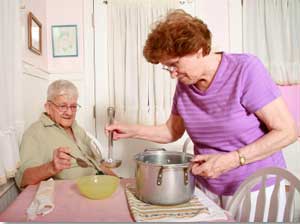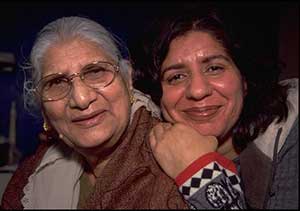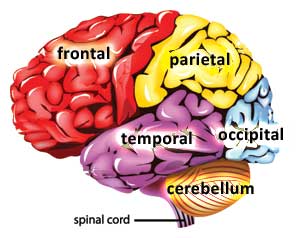
- Dementia is more common as we age. Evaluation for dementia requires assessment of cognition, behaviours and function.
- Management strategies include modification of vascular and lifestyle risk factors. Cholinesterase inhibitors are used to treat most forms of dementia.
- Consideration of caregiving issues and future planning is essential.

- People are living longer than they did in the past. Dementia is more common as people get older. It affects approximately 10% of people over the age of 65 and the prevalence doubles every 5 years after the age of 65. Dementia is not part of normal aging.
- Proper information and support are necessary for all involved – the person with dementia, their family and caregivers.
Definition of dementia
It is a disease of the brain characterized by changes in thinking and severe enough to interfere with daily functioning and the quality of life.
Symptoms and Signs of Dementia

- Dementia usually develops over a number of years and slowly worsens. Sometimes dementia appears to develop suddenly because of a crisis. However, upon reflection, it is evident that the problems were there all along, just not as noticeable as when the crisis developed.
- The signs are often reflected in the “ABC’s”
- A – activities of daily living, such as toileting, feeding, dressing, mobility, meal preparation, medication adherence, driving, management of finances and household.
- B – behavioral changes can be evident such as anxiety, depression, loss of initiation, disinhibition, agitation/ aggression, hallucinations, delusions and with personality.
- C – cognitive changes which can be noted with memory loss as evidenced by repetitious questions, misplacing objects, forgetting appointments or details of conversations. Language can be affected with word finding difficulties and troubles with following conversation or instructions. Temporal disorientation for dates, location and the day of the week may be present. There may be difficulty with navigating the environment and wandering issues may arise. Recognizing places, people or things may be altered. Motor planning can change. Executive function for problem solving, reasoning, goal setting and organization can become impaired. Multi-tasking is more of a challenge.
Detecting Dementia
A detailed and accurate history is required from caregivers who know the person well, as the person often lacks insight into the changes with their thinking. In addition to the changes noted with the “ABC’s”, the onset and course of those symptoms needs to be mapped out. Additional steps required for the physician to make a diagnosis of dementia involves performing a physical exam including cognitive testing, completing key blood tests and ordering diagnostic imaging. The benefits of early detection of dementia allows for future planning, safety considerations, modification of potential lifestyle and vascular risk factors and initiation of drug therapy for the dementia.
Types of Dementia
 Alzheimer's Disease
Alzheimer's Disease
Alzheimer's Disease is the most common type of dementia. The onset is typically insidious and is progressive. Risk factors for this dementia include increasing age, family history of dementia / genetics, cardiovascular and health behaviors and female gender.
Mixed Dementia
A combination of Alzheimer’s dementia and cerebrovascular disease is increasingly diagnosed based on physical exam and diagnostic imaging features. This is also known as vascular cognitive impairment. Individuals with this dementia may show executive dysfunction, impairment with attention and mood and slowed mental processing. Pure vascular dementia is diagnosed when there is a temporal relationship between a vascular event like a stroke and impaired cognition and function.
Other Types of Dementia
Dementia with Lewy Body presents with fluctuations in cognition, early and recurrant visual hallucinations, features of parkinsonism with rigidity, sleep disorder and sensitivity to certain drugs called neuroleptics.
Frontotemporal dementia is often seen with a younger population less than 65 year of age, early behavioral and personality changes and/or marked language difficulties. Neuroimaging is often helpful in diagnosing this type of dementia.
Dementia Care
 Help is available for dementia from family doctors, health
care professionals and physicians specializing in the care of older adults. Additional support is available through the Alzheimer’s Society.
Help is available for dementia from family doctors, health
care professionals and physicians specializing in the care of older adults. Additional support is available through the Alzheimer’s Society.
Care Strategies
While there is no cure for dementia, it is important that vascular and lifestyle risk factors are modified if possible. Physical activity as well as social engagement are encouraged. Structure and routine are essential. Caregiver support and education is a key ingredient to coping and providing ongoing assistance to the person with dementia. Advance directives in the form of a personal directive and enduring power of attorney are encouraged if the person with cognitive impairment is capable of understanding the process. Safety with driving and usage of tools needs to be determined. Treatment for the varying dementias is similar using cholinesterase inhibitors except for frontotemporal dementia. Certain behaviours are treated with psychotropic medications based on severity of symptoms.
While the content of each Caregiver College Topic may be linked to a variety of other Topic areas, the following have been identified as a Key Linkage which you may be interested in also reviewing:
Alzheimer Society
- Main Website: The website provides the latest information on Alzheimer Disease, related dementia, caregiving, support, research, treatment and programs and services throughout Canada.
- Caregiver Support: Taking care of someone with Alzheimer's disease can be a demanding task. It requires time and energy.
Alzheimer Society Alberta and Northwest Territories
- The Alzheimer Society of Alberta and Northwest Territories (ASANT) exists to alleviate the personal and social consequences of Alzheimer's disease and to promote the search for a cure.
- Vascular dementia is an umbrella term that describes impairments in cognitive function caused by problems in the blood vessels that feed the brain.
University of California, Memory & Aging Center
- Practical Tips for Daily Life: Guaranteeing safety for patients with dementia is often a struggle for caregivers – trying to balance keeping the individual safe but allowing them to continue to be as independent as possible.